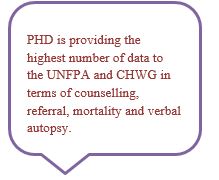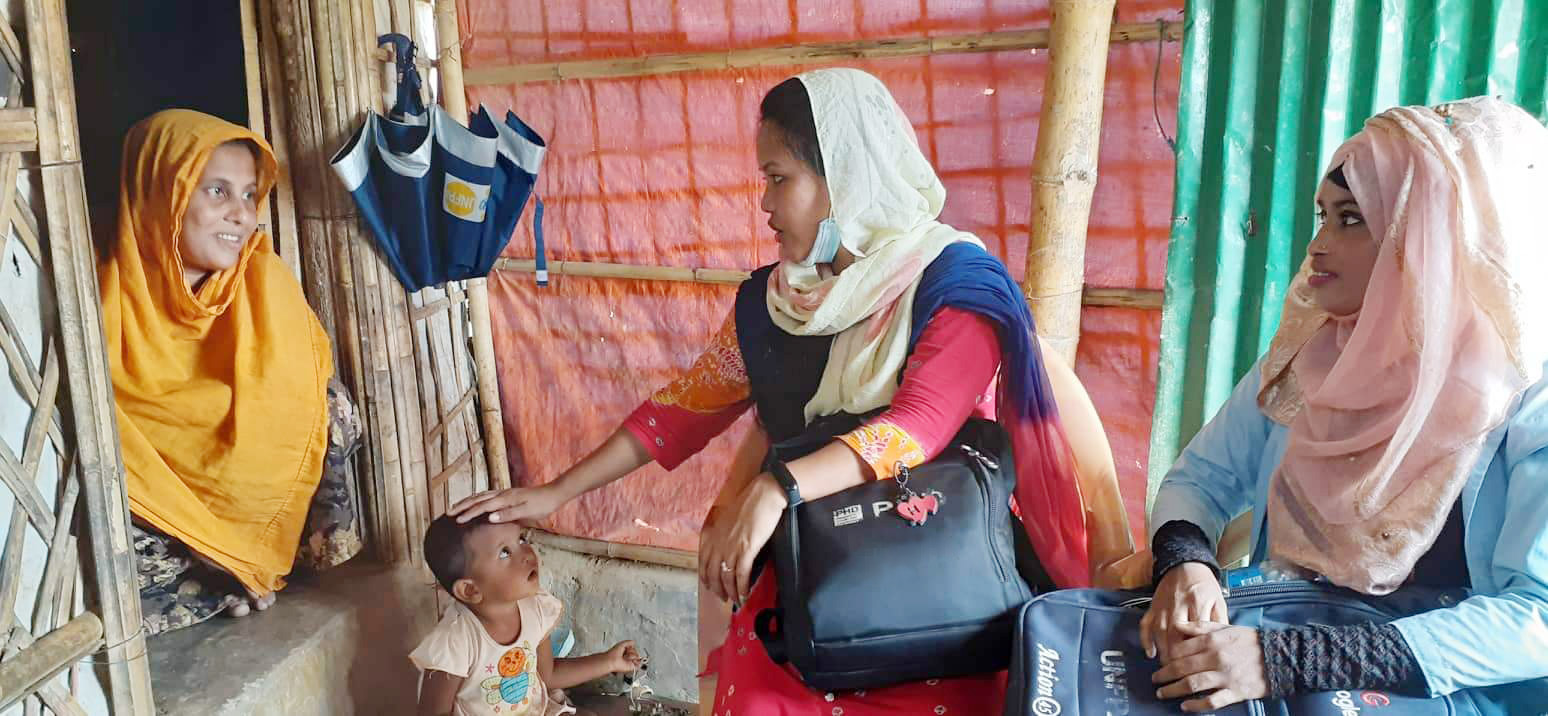|
Project Title- Community Based Maternal, Neonatal Sexual & Reproductive Health Program for the Rohingya & Host Community, Cox’s Bazar.
Coverage of Areas - Total 22 camps and 5 Unions in Ukhiya and Teknaf Upazilla.
Donor - UNFPA Bangladesh with multi-donor support
Duration - July 2018 to December 2025
Population focus- Pregnant Women, Lactating Mothers and Caregivers, Adolescents Girls, , Under 5 Children and others.
|
The Rohingya population after the last recent influx since August 2017 became about 1 million; of which 52 percent comprises of women and girls and 55-60 percent is children. There has been a serious lacking of knowledge regarding their sexual and reproductive health rights and information among this community people, found by humanitarian organizations. And also found that the likelihood of death for the women and children is 14 times higher than a man.
With immense previous experience working with Rohingya community on the Maternal, Newborn Sexual and Reproductive Health Program issues and the vast experience in community mobilization in the crisis-affected community on their rights to health, especially SRHR etc. made PHD a major actor in this project.
PHD holds the highest number of CHWs (350) and largest working areas, approximately 30% of the population in the camp and host community in Ukhiya & Teknaf sub-district. These PHD-CHWs visit around 4200 houses every day. Their visits include communicating health messages and refer pregnant mothers for ANC, delivery, PNC to the nearby facilities. They also counsel for facility delivery, maternal and neonatal care, family planning, GBV, CMR, STI/RTI, adolescence by PHD.

|
Objective
The overall objective of the MNRHP project is to develop awareness on sexual and reproductive health among the community people by recurrent and reinforced counseling and develop their health seeking behavior and consciousness, reduce maternal and child death, thereby promote hale and hearty family in the long run. As well as, PHD seeks to develop a given number (300) of adolescent girls as skilled girls and peer educators after providing comprehensive sexuality education for one year, who will be practicing rights on sexual and reproductive health in their own lives and counseling as well as influencing the other neighborhood girls simultaneously and ultimately reduce the rate of early marriage and early pregnancy in the long run.
|
|
Expected Outputs
- Increased awareness and capacity of the community people to receive integrated and equitable sexual and reproductive health services, including STIs/HIV,GBV, FP in development and humanitarian context.
- Improved awareness & capacities of adolescent girls to practice SRHR and access to SRH services autonomously and reduce child marriage & early pregnancy among adolescent girls in the community.
|
|
Key Interventions
- Daily Domiciliary Visits by CHWs: CHWs visit door to door 6 days in a week to make the community people aware regarding the services on maternal care, institutional delivery, neonatal care, family planning, STI/RTI, GBV, ASRH, CMR through counselling, motivate and refer the community people to receive services from health facility on their respective needs.
- Community Based SRH information assembly with RHAG: CHWs and their Supervisors disseminate information about Antenatal care, Postnatal care, Essential Newborn Care, Family planning, Child marriage, GBV, Child protection and other SRH related information by using FLIPCHART with the RHAG (Reproductive Health Awareness Group, consists of community leaders) members.
- Court Yard session: Supervisor and CHWs conduct courtyard session with 12 pregnant mothers usually in order to aware them regarding maternal and neonatal care and other SRH services.
- Advocacy with Government stakeholders meeting in CCs (15 CC) and FWCs (5): To maintain a good liaison with government stakeholder, CHWs, Supervisors and FCs attend meetings at CCs and FWCs regularly
- Mortality Surveillance & reporting in 6 sectors: information from community level through different steps analyse and compiled by the MIS team report to six sectors such as; UNFPA, KOBO CDC, CHWG, DDFP- Cox, EWARS, WRA VA KOBO.
- Community Dialogue with Majhis & Caregivers: The program is conducted with the caregivers of the adolescent girls and Majhis (community leaders).
- ASRHR Weekly session: There are 3 learning centres in 3 camps of PHD for total 300 adolescent girls. Besides, ASRH Mentors visit household of girls every day for better response from the community.
|
|

